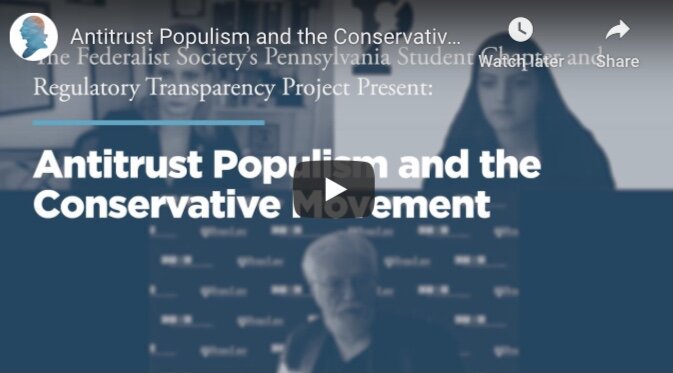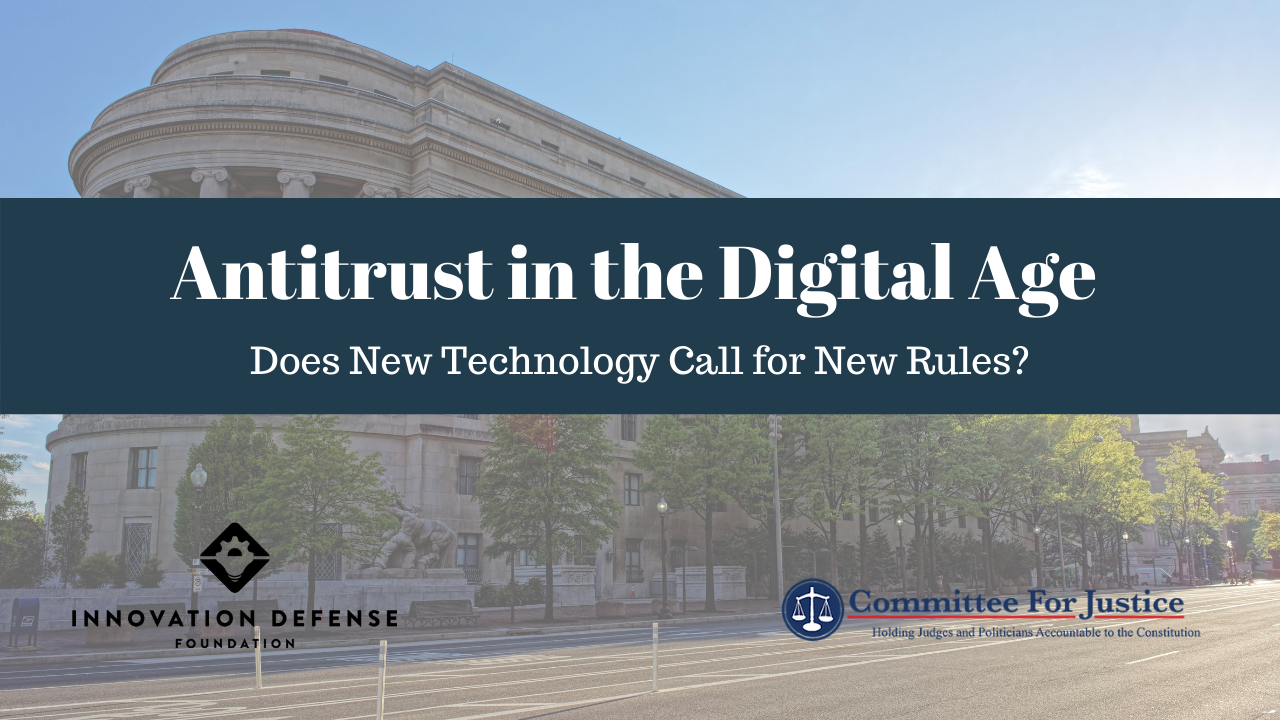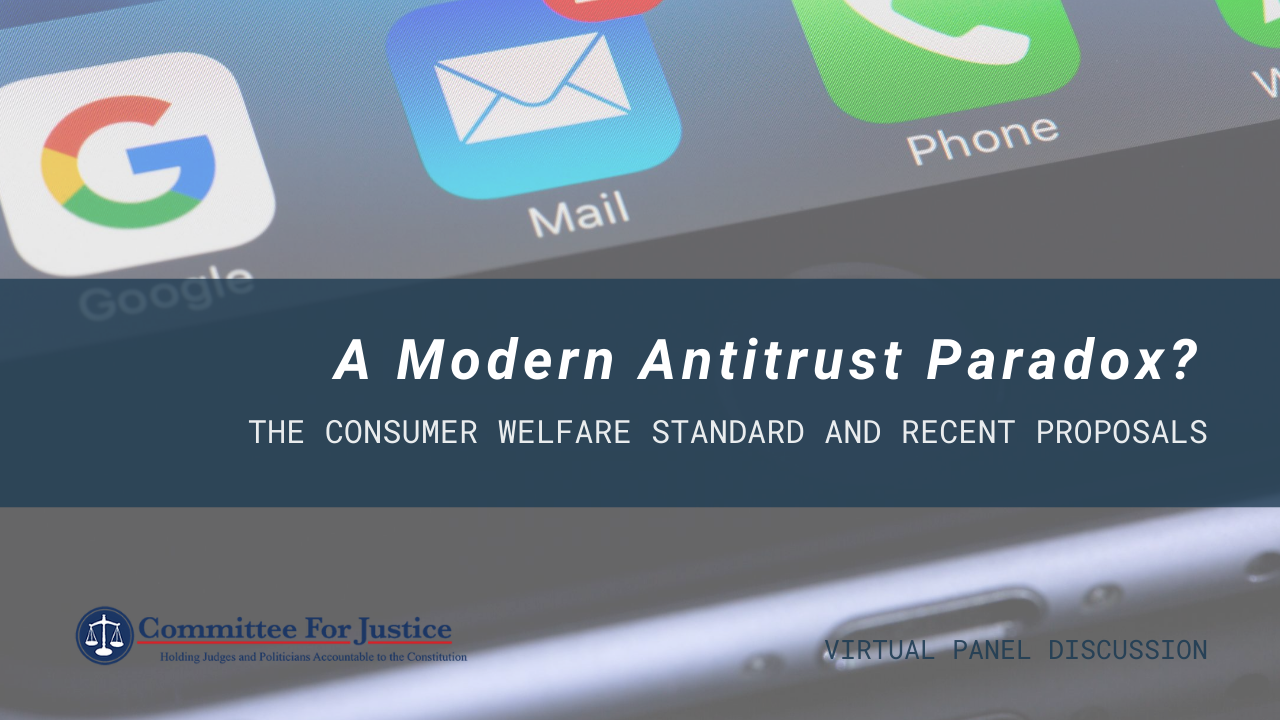
The Conservative Case Against Weaponizing Antitrust Law
Today, the consumer welfare standard remains one of the greatest success stories of the conservative legal movement. However, recent sentiments within both parties have attracted proposals that would mark a return to highly-interventionist, pre-1970s jurisprudence in which the “sole consistency,” as Justice Potter Stewart famously said, “is that the government always wins.” Our panel of experts discuss these proposals, their implications, and the best path forward for conservatives.

Event Video: The Antitrust Cases Against Facebook: Examining the Lawsuits and Implications
Our panel of experts discuss the antitrust lawsuits against Facebook, the merger review process and FTC enforcement, and assess the implications for consumers, companies, and the law.

Virtual Panel Discussion: New Technologies, Same Principles: The Conservative Case Against Weaponizing Antitrust Law
During the 1986 Supreme Court confirmation hearings for then-Judge Antonin Scalia, he was asked about his views on antitrust. “In law school, I never understood [antitrust law],” Scalia explained, “I later found out, in reading the writings of those who now do understand it, that I should not have understood it because it did not make any sense then.” This much-needed coherency in antitrust law was brought about by the adoption of the consumer welfare standard. The intersection of economic analysis and the law provided a neutral underlying principle that allowed conservatives to reign in a broad, unprincipled area of the law that was once used as a political and socioeconomic tool.
Today, this remains one of the greatest success stories of the conservative legal movement. However, recent sentiments within both parties have attracted proposals that would mark a return to highly-interventionist, pre-1970s jurisprudence in which the “sole consistency,” as Justice Potter Stewart famously said, “is that the government always wins.” Our panel of experts will discuss these proposals, their implications, and the best path forward for conservatives.

Virtual Panel Discussion: The Antitrust Cases Against Facebook: Examining the Lawsuits and Implications
Last week, the Federal Trade Commission (FTC) and a coalition of 48 state attorneys general filed two separate lawsuits against Facebook. The complaints argued that the company maintained a monopoly position in the “personal social media networking” market through a series of acquisitions over the past decade intended to buy up potential rivals and by imposing restrictive policies to hinder companies that present competitive threats. Both suits call for the divestiture of Instagram and WhatsApp, along with other proposed remedies. Our panel of experts will discuss the lawsuits, the merger review process and FTC enforcement, and assess the implications for consumers, companies, and the law.

Event Video: State Antitrust Laws and Enforcement by Attorneys General
On Friday, November 20, pur panel of experts will discuss antitrust federalism, the complexities of state enforcement actions, and how state antitrust law can differ from federal law (and why that’s potentially a problem). We will also delve into the current investigations as well as one of the last major multi-state antitrust actions, Ohio v. American Express. Register to Attend

Virtual Panel Discussion: State Antitrust Laws and Enforcement by Attorneys General
On Friday, November 20, pur panel of experts will discuss antitrust federalism, the complexities of state enforcement actions, and how state antitrust law can differ from federal law (and why that’s potentially a problem). We will also delve into the current investigations as well as one of the last major multi-state antitrust actions, Ohio v. American Express. Register to Attend

Antitrust Populism and the Conservative Movement
The Federalist Society's Pennsylvania Student Chapter and the Regulatory Transparency Project co-sponsored an event on "Antitrust Populism and the Conservative Movement” with Ashley Baker and Professor Herbert Hovenkamp.

FTC v. Qualcomm: The Recent Ruling On Antitrust Adventurism
On Tuesday, the Ninth Circuit reversed the Federal Trade Commission's win in the agency's case accusing Qualcomm of violating antitrust law through its licensing practices for standard-essential patents covering cellular technology. Richard Epstein, John Shu, and Ashley Baker discuss this ruling and explore the history, arguments, and implications for the current debate over antitrust enforcement and the competitive process in high-tech markets..

Antitrust in the Digital Age: Does New Technology Call for New Rules?
America’s technology companies have created huge gains for consumers, developing networks and products that connect the world in ways that were inconceivable just 20 years ago. Yet this progress has not been without its critics. The dominance of large platforms has led to concerns about the harmful effects of lock-in and path dependency, with many arguing the technology sector is unique and requires new approaches to antitrust policy. In particular, it is argued that the consumer welfare standard that guides American antitrust policy is ineffective for regulating Big Tech. Yet with the lack of demonstrable consumer harm, would increased government interventions improve the market?

Antitrust Populism and the Rule of Law
Our panel last month discussed Robert Bork’s consumer welfare standard, which has heavily influenced the evolution of antitrust analysis and enforcement over the past 42 years, and how Bork’s paradigm is under attack. Many defenders of the rule of law are concerned with the populist notion that competition law should be weaponized and used as a tool to address broader socio-economic concerns. Furthermore, adopting populist proposals that seek to rewrite antitrust law would upend more than a century of legal and economic learning and progress. Richard Epstein, Mark Jamison, and Kristian Stout dive deeper into the recent populist antitrust movement and how the failure to distinguish between the proper and improper uses of antitrust laws poses a threat to the rule of law.

A Modern Antitrust Paradox? The Consumer Welfare Standard and Recent Proposals
Robert Bork’s consumer welfare paradigm, which has heavily influenced the evolution of antitrust analysis and enforcement over the past 42 years, is under attack. Critics from both parties assert not only that antitrust has been unable to keep up with developments in the high tech, finance, and communications industries, but also that competition law should be weaponized and used as a tool to address broader concerns such as privacy, inequality, and political viewpoint discrimination. In response, the DOJ and FTC have launched investigations into Amazon, Apple, Facebook, Twitter and Google. Meanwhile, the House Judiciary Committee has launched its own investigation into these companies and are also reviewing whether changes are necessary to existing antitrust laws. It is critical to understand the arguments at the core of the antitrust debate and what is motivating recent proposals. Will Robert Bork’s “consumer welfare” standard survive?

